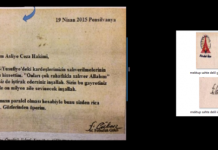The 16th Criminal Department of Turkey’s Supreme Court of Appeals has declined to uphold the aggravated life sentences handed down by a lower court to journalists Ahmet Altan, Mehmet Altan, Nazlı Ilıcak, Fevzi Yazıcı, Yakup Şimşek and Şükrü Tuğrul Özşengül, Turkish media reported on Friday.
The ruling recommended Mehmet Altan’s acquittal due to a lack of sufficient and credible evidence while stating that other defendants should be found not guilty of violating the constitution but guilty of knowingly and wilfully aiding the faith-based Gülen movement.
The court also rejected requests for the release of Ilıcak, Altan, Yazıcı, Şengül and Şimşek. Mehmet Altan was released pending appeal.
The file will now be sent back for review by the high criminal court in İstanbul that oversaw the journalists’ case.
If the lower court abides by this ruling, Mehmet Altan will be acquitted and the prison sentences of other five journalists will be reduced to no longer than 15 years.
On the other hand, the lower court has the authority to ignore the decision, in which case the file will be forwarded to the Supreme Court of Appeals’ General Assembly for Criminal Matters, which will deliver the final decision.
On February 16, 2018, the Istanbul 26th High Criminal Court sentenced Ahmet Altan, Mehmet Altan, Ilıcak, Şimşek, Yazıcı and Özşengül to aggravated life for “attempting to overthrow the constitutional order.”
Announcing its verdict at the end of five days of hearings that took place from February 12-16 in Silivri, the court ruled that there was no need to issue separate verdicts on the charges of attempting to overthrow the parliament and attempting to overthrow the government as those offenses were “implicit in the offense of ‘attempting to overthrow the constitutional order’.”
The court acquitted Tibet Murat Sanlıman, the only defendant who had been released pending trial, and ruled for the lifting of judicial probation.
The court ruled that due to the defendants’ conduct throughout the trial, no reduction of sentence would be granted.
The defendants were charged on the basis of their writings, televised remarks and social media posts as well as phone communication records and witness statements, although no witness ever appeared before the court to testify or submit to questioning.
The Altans were initially arrested for “sending subliminal messages” during a television program on which they appeared on the night of July 14, 2016 along with Ilıcak. But that accusation disappeared after an international outcry, and they were instead accused of “making statements that are evocative of a coup.” (SCF with turkishminute.com)















